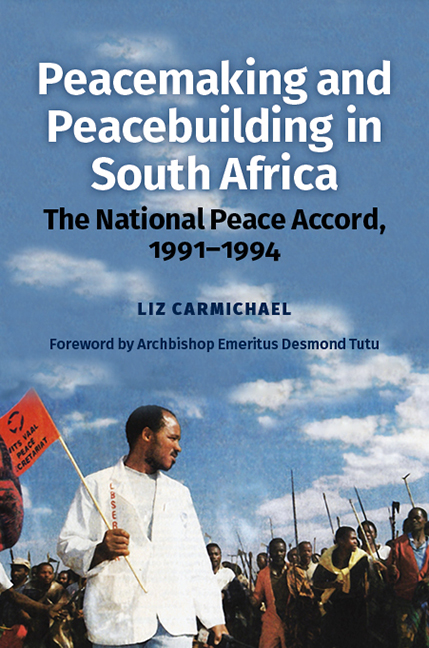Book contents
- Frontmatter
- Dedication
- Contents
- List of Illustrations
- List of Abbreviations
- Glossary
- Acknowledgements
- Note on Nomenclature
- Transition Timeline
- Foreword
- Introduction
- Part One Peacemaking, Peacebuilding, and the South African Conflict
- Part Two Peacemaking
- Part Three Peacebuilding
- Conclusion: Impact and Unfinished Business
- Bibliography
- Index
15 - First Explorations in Reconstruction and Development (SERD)
Published online by Cambridge University Press: 08 October 2022
- Frontmatter
- Dedication
- Contents
- List of Illustrations
- List of Abbreviations
- Glossary
- Acknowledgements
- Note on Nomenclature
- Transition Timeline
- Foreword
- Introduction
- Part One Peacemaking, Peacebuilding, and the South African Conflict
- Part Two Peacemaking
- Part Three Peacebuilding
- Conclusion: Impact and Unfinished Business
- Bibliography
- Index
Summary
Introduction
Chapter 5 of the Accord, ‘Measures to Facilitate Socio-Economic Reconstruction and Development’ (soon shortened to ‘SERD’) recognized this activity to be integral to peacemaking and peacebuilding. The carrot of socio-economic improvement, the ‘peace dividend’ if violence stopped, was held up before conflicted communities. SERD looked toward the ‘pre-emption of violence and then toward integrating into the overall needs for socio-economic development’ (5.10).
The NPC immediately launched a national SERD Sub-committee, which met major funding bodies, encouraged the formation of regional and local sub-committees, and in April 1993 embarked on an ambitious nation-wide SERD capacity building programme, which unfortunately fell victim to political suspicions. Training was devolved onto the regions. Regions forwarded project proposals to the NPC's National Peace Accord Trust (NPAT) which, with modest funds from government and business, supported a variety of projects before concentrating on trauma counselling.
In 1994 responsibility for SERD passed to the NPS, and the national Sub-committee was replaced by an Advisory Board of the Regional SERD Coordinators. Overshadowed by other activities pre-election, SERD developed unevenly but scored some notable successes. It became the structures’ main focus post-election. The structures expected to contribute significantly at grassroots to the new government's Reconstruction and Development Programme (RDP) but SERD activity ceased with the closure of the structures in December 1994.
SERD's mandate: Chapter 5
Chapter 5 of the NPA directs the NPC and RDRCs to establish SERD sub-committees, and rehearses the principles of ideal, inclusive, community-based development.
Reconstruction and development projects must actively involve the affected communities. Through a process of inclusive negotiations involving recipients, experts and donors, the community must be able to conceive, implement and take responsibility for projects in a coordinated way as close to the grassroots as possible. In addition reconstruction and development must facilitate the development of the economic and human resources of the communities concerned. (5.1)
The chapter develops these themes: inclusive, non-partisan involvement, mobilizing the whole community, each individual having a cooperative role and being ‘assisted and encouraged to accept responsibility for their socio-economic well-being’ (5.4). Gastrow (1995, p.87) remarks on the influence of COSATU on this text, emphasizing grassroots empowerment against neo-liberal growth-oriented approaches to development.
- Type
- Chapter
- Information
- Peacemaking and Peacebuilding in South AfricaThe National Peace Accord, 1991-1994, pp. 329 - 351Publisher: Boydell & BrewerPrint publication year: 2022



